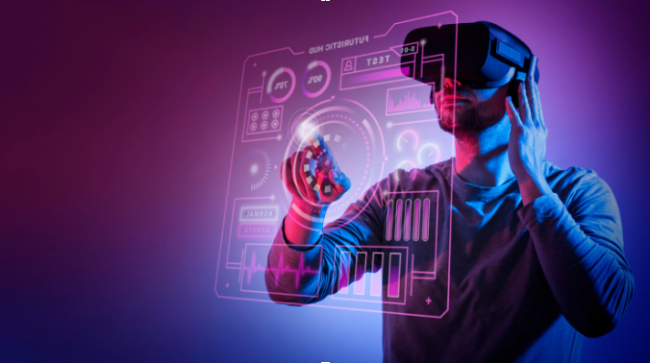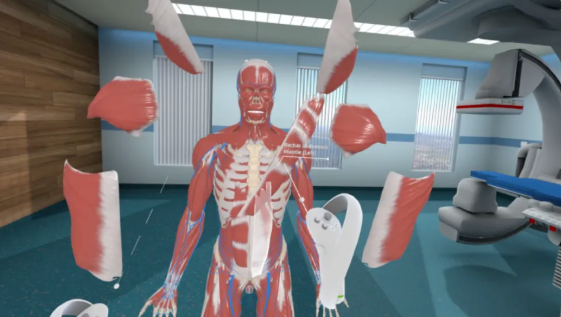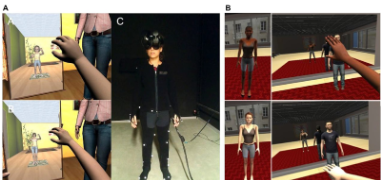
We all heard the phrase, “Once upon a time ….”, whether it’s through listening to others in films, reading a book, or presenting in front of a class, we come across different ways of storytelling. It has always been a tool for understanding others, sharing experiences, and knowledge, and building empathy. Virtual Reality, among the latest technologies, bridges the gap between seeing and listening to living a tale. Despite the availability of this technology that makes us see things through a different lens, could it spark more compassion and awareness in society?
Unveiling the body
Human Anatomy VR, is an app that provides an immersive 3D model of the body with interactive features. It allows user interaction with a hands-on manager, which could help illuminate the struggles of people with impairments, disabilities… When I stepped into the experience, I felt in a space where life like the human body floats around me. What amazed me was when put in the app, I could strip the layers of the skin and muscle, making it feel physical, to the chambers of the heart where I could see the tiny valves open and close, and microscopic neurons acting like circuits. It was amazing to see the realism, because it made learning a firsthand experience and showed me the body's symphonious functions. When I took off the headset, it was strange to go back to the real world because of the disconnect that led me to see the complexity of our body and how there is so much hidden that can’t be seen with the naked eye.

Mental Health
VR enhances both anatomical comprehension and empathy in medical education. In a time when medicine is becoming more advanced, the aspect of patient care with empathy is being overlooked. Numerous studies show how VR leads to better patient satisfaction, however when medical students go from bookworm to on-the-job hospital reality, the transition is invisible. One such study highlights the effectiveness of Immersive Virtual Reality(IVR) in enhancing empathy among students as the aim was to see how technology helps to create a link between conceptual and real-life patient experiences. The study included 19 medical students and the patient case for whom they provided medical treatment was Frank: a 72-year-old who struggled with social isolation. The students experienced his frustration and symptoms firsthand and then were assessed with the Jefferson Scale of Empathy. One student highlighted, “ It feels tangible. I just kept looking at my hands the whole time. I feel like there was something about interacting with the space and seeing it. ” The emphasis is that an IVR is an effective tool for medical school education since it sustains empathy, and makes a long-lasting impact on students while making them aware of the struggles others face cultivating them to be more compassionate and reciprocating to the needs of the patient.
Surgeon Evolution
How can VR be better than the effectiveness of real-world operations? There can be an embracement of surgical technology becoming efficient, as there is a testament for understatement of the medical perception and help students to doctors understand how this is a complex but valued field. Dr. Shafi Ahmed’s use of VR in surgical procedures shows how technology can transform perspective to foster empathy. In 2016, he streamed a colon surgery in 360°, allowing VR to be experienced firsthand, making the complex procedures transparent and attainable. More recently with telemedicine, he collaborated with a surgeon in London via a VR headset to guide a team in Kenya through a difficult orthopedic surgery, with live feedback. This tool highlights how technology could help with collaborations and perspectives despite their being distant as it helps nurture an appreciation for challenges faced by medical professionals. Seeing a perspective from a doctor and patient aside also raises global awareness of occurring inequalities in global health care. By making abstract hardships more real, VR inspires action leading to a more understanding, distinguishing itself from normal storytelling by immersing the audience with observation leading to a more poignant bond.
This is truly a revolution with empathy. It’s simply because of VR’s immersiveness while traditional storytelling is not as clear in showing experiences. As a student with an interest in medicine, I have gratitude for narratives reinforcing awareness in society through VR because it shows technology development and how the shift in perspective, I believe, is the key to fostering a compassionate approach to more issues.
Metacognitive Conveyance
The power of empathy can expand to more abstract forms since VR is realistic. Dr. Maria V Sanchez argues that presence - the sensation of being physically present in a non-physical world is important to understanding consciousness and creating an emotional connection as it helps understand perception and sparks further empathy as it’s a psychological state where sensation and cognition are tweaked. One study that proves this is the importance of long-term behavior change through what could be seen as the rehabilitation of victims. Male offenders of domestic violence were put into the shoes of female victims. The experience evoked fear damage, leading to a personal connection that compels offenders to confront their harm. When VR is used in immersive techniques through rehabilitation, training, campaigns, to even therapy, the sense of cognition occurs where psychological biases are broken. It also further heightens how storytelling by VR is superior to what is said on pen and paper, as it can motivate empathy and lead to a change in demeanor.

The question of immersiveness and emotional connection is proven by VR as they transform challenges from fair realities to see the understanding of conflicts. Ultimately, the fantasy of VR is not just adapting differences in storytelling but redefining empathy experiences and creating awareness of others' struggles. Since humans are in tangible realities, VR transforms the concepts into emotional events that help expand meaningful change in mankind. Because empathy can be cultivated, the question of whether VR will be the key to a more compassionate society when usually understanding drives action, I would say the fantasy of VR is just surfacing.
Works Cited:
Alieldin, R., Peyre, S., Nofziger, A. et al. Effectiveness of immersive virtual reality in teaching empathy to medical students: a mixed methods study. Virtual Reality 28, 129 (2024). https://doi.org/10.1007/s10055-024-01019-7
Sanchez-Vives MV, Slater M. From presence to consciousness through virtual reality. Nat Rev Neurosci. 2005 Apr;6(4):332-9. doi: 10.1038/nrn1651. PMID: 15803164
Image Sources:
Headline Image
Image 1
Image 2

